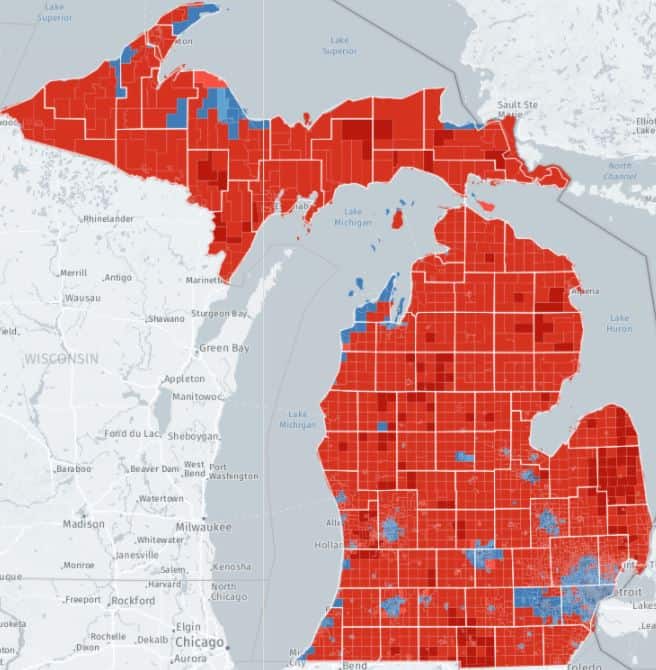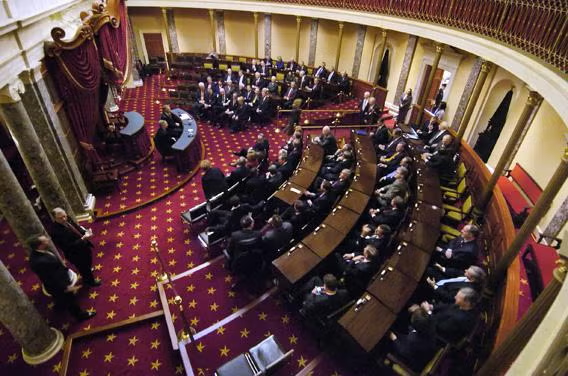LANSING—Officials with PlanetM, the state of Michigan’s mobility industry accelerator, announced its next fround of testing grants, totaling $200,000, for drone and connected vehicle technology programs.
Testing of the technologies will take place at Michigan testing centers, including Mcity at the University of Michigan in Ann Arbor and the Michigan Unmanned Aerial Systems Consortium (MUASC) in Alpena.
“Our testing grant program brings together two key assets in our state’s growing mobility ecosystem—our premier testing facilities and access to capital,” said Charlie Tyson, mobility technology activations manager for the Michigan Economic Development Corp. “We believe programs like this fuel mobility innovation, and we look forward to supporting the acceleration of these technologies.”
The projects funded were:
Great Lakes Drone Co. – $50,000
Stevensville-based Great Lakes Drone Co. received a $50,000 grant to test a first-of-its-kind aerial agriculture solution at the MUASC. In partnership with California-based Skyx, Great Lakes Drone will use the funding to further develop an integrated hardware and software automated spraying system in an effort to minimize environmental impact within the agriculture industry. For example, this aerial solution would enable the use of a handful of drones to spray only the crops that need additional nutrients rather than blanket spraying all crops; the same is true for mosquito treatment of crops, allowing farmers to more accurately target larvae spots and in turn, reduce the amount of chemicals used across their fields. Said Ashley Munson, business development director at Great Lakes Drone: “The ability to combine our swarm experience of operating multiple drones at one time with the software and hardware expertise of Skyx, we can help revolutionize the future of aerial agriculture operations. Our goal is to find better, easier and more productive ways to accomplish what needs to be done, through technology and innovation, to decrease our environmental footprint. This mobility grant allows us to get one step closer to making that happen.”
Rave Cave – $100,000
Sterling Heights-based Rave Cave received a $100,000 grant for ongoing testing at the MUASC to ready its laboratory for the development of unmanned aerial systems infrastructure and platforms in an immersive 3D virtual environment using real terrain data for evaluation. This project uses 3D visual models to create flight paths, traffic patterns and landing sites for real-world air mobility. Interactive models built for visualization and simulation will allow communities across Michigan, as well as the public and private sectors, to understand how UAS will be integrated throughout the state’s mobility infrastructure. In addition, this project will aid decision makers on air mobility issues related to airspace and safety, while exploring new infrastructure needs and possible locations of future flight corridors and takeoff or landing zones. “The program has been well received,” said Art Adlam, Rave Cave president. “To date, the simulation allows control of a generic drone in representations of existing and envisioned environments. Current environments include a potential test site in the Upper Peninsula, a portion of downtown Detroit and an envisioned office complex located in a fabricated mountainous terrain.”
P3 Mobility – $50,000
Ann Arbor-based P3 Mobility received a $50,000 grant to test software to allow vehicles to communicate with roadside infrastructure at the University of Michigan’s Mcity autonomous and connected vehicle proving grounds. In partnership with Siemens, P3 Mobility’s software is intended to increase vehicle and pedestrian safety, reduce emissions and lower insurance costs by providing improved insights to driver behaviors. Introduced to PlanetM through Michigan’s Small Business Development Center, P3 Mobility is using the funding to build connected roads. “The PlanetM grant has allowed us to test our technology at one of the best connected vehicle testing grounds in the country,” said Erin Milligan, P3 founder and CEO. “The grant has provided us the opportunity to bring partners from Ontario, Canada into Michigan and is paving the way for deployment in both U.S. and Canada.”
The PlanetM Mobility Grants, separated into two categories—testing and pilots—encourage mobility startups and corporations to deploy their technologies in Michigan, or prove out their technology at one of the state’s many testing centers for connected and autonomous vehicles. Included are Mcity at the University of Michigan in Ann Arbor, the American Center for Mobility in Ypsilanti, the GM Mobility Research Center at Kettering University in Flint, the Michigan Unmanned Aerial Systems Consortium in Alpena, and the Keweenaw Research Center and the Great Lakes Research Center at Michigan Technological University in Houghton. PlanetM partners with NextEnergy to support project management services for each pilot program. The PlanetM Mobility Grant program has awarded more than $2 million in grant funding since its inception in 2018. For more information and to apply, visit planetm.com/grants.
Michigan’s Office of Future Mobility and Electrification brings together mobility and electrification efforts across Michigan’s government, academic and private sectors to create long-term economic opportunity and accelerate the development, deployment and adoption of advanced mobility technologies. It spans the existing foundation of mobility initiatives through the Michigan Economic Development Corp., the Michigan Department of Transportation, the Michigan Department of Labor and Economic Opportunity, and the Michigan Department of Environment, Great Lakes, and Energy, among others.
Visit www.PlanetM.com/OFME to learn more.






